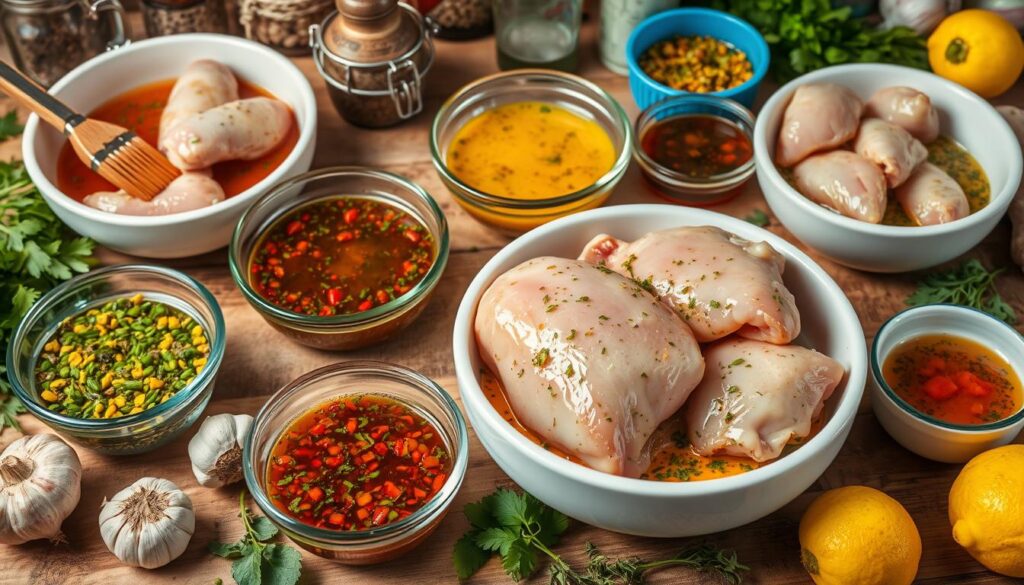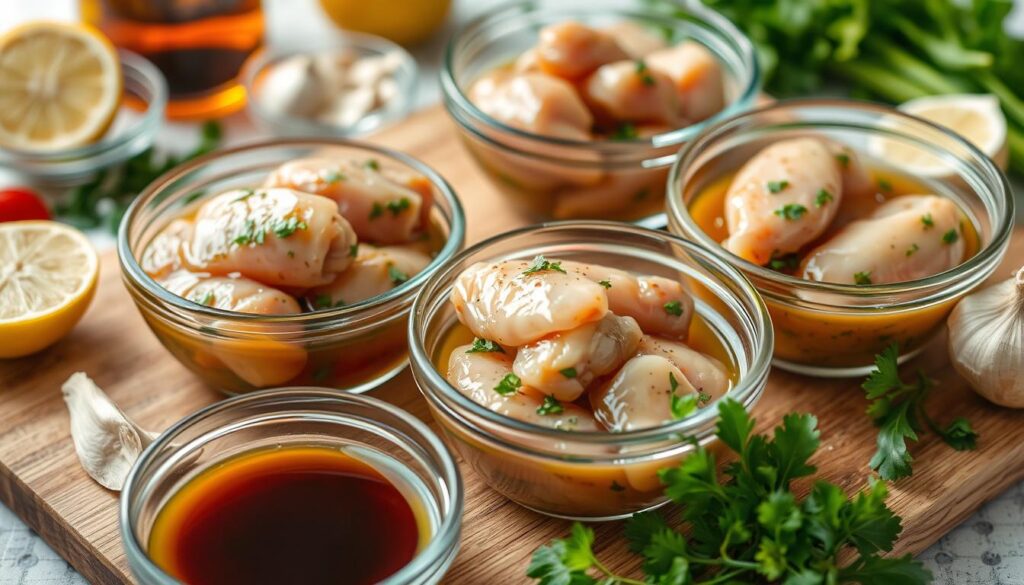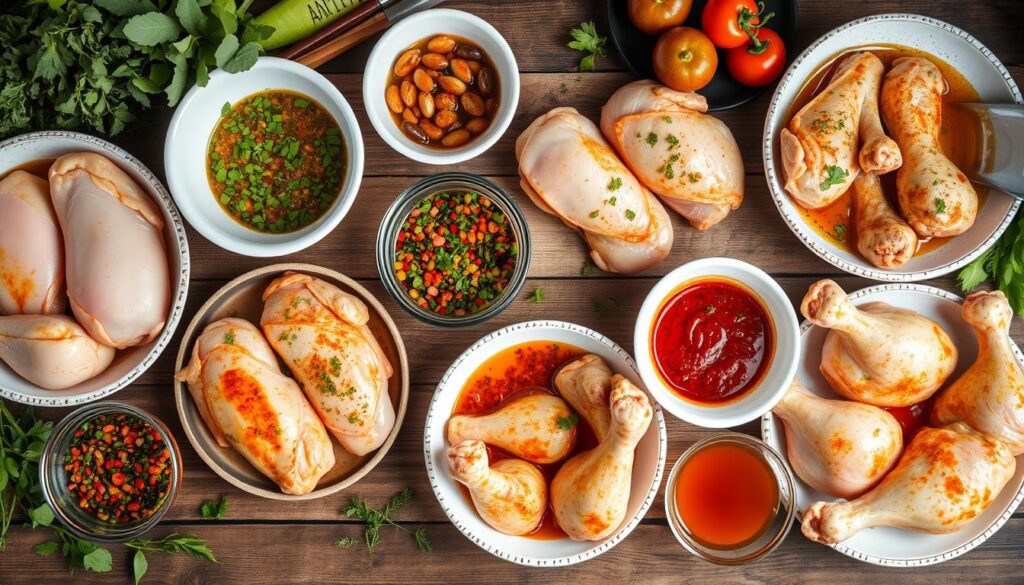
Every home cook has faced the problem of dry, tasteless chicken. I remember the first time I made a bland chicken breast taste amazing with the right marinade. Whether you’re new to cooking or experienced, learning to marinate chicken can elevate your meals.
Marinating is more than just soaking meat in liquid. It’s a mix of science, flavor, and skill that makes chicken tender and juicy. This guide will teach you how to make the perfect marinade. You’ll learn about the basic ingredients and how to avoid common mistakes.
Key Takeaways
- Marinating can dramatically improve chicken’s flavor and tenderness
- Understanding the right balance of acids, oils, and seasonings is crucial
- Proper marinating time varies depending on the chicken cut
- Food safety is paramount when preparing marinated chicken
- Experimenting with different marinade ingredients can transform your cooking
Understanding the Science Behind Chicken Marinades
Marinating is more than a cooking tradition. It’s a complex chemical process that changes chicken flavor through science. Knowing this can make your cooking much better.
The science of marinating involves complex interactions between ingredients and meat proteins. About 5% of water in animal flesh is bound to proteins. The rest is between muscle filaments. This setup lets marinades do their magic.
How Marinades Enhance Flavor
Marinades work in several ways:
- Breaking down muscle fibers
- Introducing new flavor compounds
- Improving moisture retention
The Role of Proteins in Marination
Muscle protein myosin is key in marination. It can hold four to seven water molecules because of its amino acids. This lets marinades get into the chicken and make it tender.
Chemical Reactions During Marinating
“Marination is a delicate dance of chemistry and flavor” – Culinary Science Experts
There are two main types of marination: acidic and enzymatic. Acidic marinades use things like lemon juice to break collagen bonds. Enzymatic marinades use tropical plant enzymes to soften meat proteins.
By understanding these science principles, you can greatly improve chicken flavor. Thin meat slices and the right ingredients are crucial for good marination.
Essential Components of a Perfect Chicken Marinade
Making the perfect chicken marinade starts with knowing its basic parts. The ingredients in your marinade turn simple chicken into a tasty dish. Let’s look at what makes a marinade recipe stand out.
A great marinade has the right mix of ingredients. The best marinades follow a simple plan:
- Fat: Adds moisture and spreads flavors
- Acid: Makes the meat tender and boosts flavor
- Seasonings: Brings depth and complexity
- Sweetener: Helps in caramelizing and rounding out flavors
Knowing the right amounts is key for marinade recipes. A classic mix is about the right ratios:
| Component | Recommended Ratio |
|---|---|
| Herbs/Spices | 1 part |
| Salt | 1/2 part |
| Liquid Base | Enough to cover ingredients |
“The secret to an extraordinary marinade is balance and creativity.” – Professional Chef
Experts say to dry the chicken before marinating to soak up more flavor. Wet marinades only go about ¼ inch deep, so make sure to coat evenly.
The Three Fundamental Elements: Fat, Acid, and Flavor
Making the perfect chicken marinade is an art. It combines fat, acid, and flavor. Knowing how these elements work together can turn simple chicken into a culinary masterpiece.
A great marinade has a balanced mix of ingredients. Each one is key to making a delicious dish.
Choosing the Right Oil Base
Fat is the base of a great marinade. It does several things:
- It spreads flavors evenly on the chicken
- It keeps moisture in
- It makes the dish taste better
When picking an oil, think about:
- Extra virgin olive oil (fruity and strong)
- Neutral vegetable oils
- Sesame oil for an Asian flavor
Understanding Acidic Components
Acid is a key part of marinating. It tenderizes chicken and adds brightness to flavors. Here are some acidic ingredients:
- Citrus juices (lemon, lime)
- Vinegars (balsamic, apple cider)
- Wine
- Yogurt
“A well-balanced marinade transforms chicken from ordinary to extraordinary” – Culinary Expert
Selecting Complementary Seasonings
The last part of your marinade is herbs, spices, and aromatics. They should match your fat and acid. Here are some good choices:
- Garlic and ginger for depth
- Fresh herbs like rosemary or thyme
- Spices such as paprika or cumin
- Salt to boost taste
Pro tip: Use a 3:1 oil to acid ratio for the best chicken marinades.
Dry Rub vs. Wet Marinade Methods
Marinating techniques offer two main ways to boost chicken flavor: dry rubs and wet marinades. Each method has its own strengths, turning simple chicken into a feast.
Understanding Dry Rubs
Dry rubs mix herbs and spices right onto the chicken. They make a tasty crust. They’re perfect for grilling, adding flavor without extra moisture. The benefits are clear:
- Creates a flavorful exterior coating
- Ideal for high-heat cooking methods
- Allows precise flavor control
Exploring Wet Marinades
Wet marinades mix liquid ingredients with herbs and spices. They soak deeper into the chicken. They use oil, acid, and seasonings to tenderize and flavor. The perks are:
- Increased meat tenderness
- Deeper flavor penetration
- Moisture retention during cooking
“The secret to great chicken is understanding how different marinating techniques interact with the meat’s proteins.” – Culinary Expert
Pro tip: Use about 1 tablespoon of dry rub or wet marinade per pound of chicken. Most chicken cuts need 2-3 hours to marinate. This ensures maximum flavor without losing texture.
Choosing Your Method
Choose your marinating method based on your cooking and flavor goals. Dry rubs are great for grilling. Wet marinades work best for slow cooking like roasting or braising.
Safe Handling and Food Safety Guidelines
Keeping food safe while marinating is key to avoid foodborne illnesses. Knowing how to handle food safely can greatly improve your kitchen skills.
For marinating, controlling temperature and handling are essential. You aim to stop bacteria growth and avoid cross-contamination.
Temperature Control Requirements
Right temperature is vital for safe marinade storage and chicken. Here are important tips:
- Marinate chicken in the fridge, not at room temperature
- Keep the fridge at 40°F or below to stop bacteria
- Put chicken on the bottom shelf to avoid drips
- Marinate for two to three hours for best safety
Cross-Contamination Prevention
Stopping cross-contamination is crucial for safe food handling. Follow these steps:
- Use different cutting boards for raw chicken
- Wash hands for 20 seconds before and after touching raw chicken
- Clean all items that touch raw chicken with hot water and soap
- Don’t use marinades that have touched raw chicken again
Storage Best Practices
Storing marinades right can lower food illness risks. Keep these tips in mind:
- Put marinated chicken in the fridge within 2 hours
- Eat marinated chicken within 1-2 days
- Throw away unused marinade that touched raw chicken
- Cook chicken to 165°F to ensure it’s safe
“Food safety is not an option, it’s a necessity in every kitchen.” – Professional Food Safety Expert
Marinating Chicken: Time and Temperature Guidelines

Learning the right marinating times and techniques can make your chicken amazing. Different chicken cuts need special marinating methods to get the best flavor and tenderness.
“Timing is everything when it comes to marinating chicken” – Professional Chef
Marinating techniques change based on the chicken cut and thickness. Smaller, thinner pieces soak up flavors fast. But larger cuts need more time to get deep flavors.
- Boneless chicken: 30 minutes to 2 hours
- Bone-in chicken pieces: 1 to 12 hours
- Thin chicken cutlets: 15-30 minutes
- Whole chicken: Up to 24 hours
Temperature is key for safe marinating. Always marinate chicken in the fridge, not at room temperature. This stops bacteria growth and lets flavors get into the meat.
| Chicken Cut | Recommended Marinating Time | Temperature |
|---|---|---|
| Chicken Breasts | 30 minutes – 2 hours | 40°F (Refrigerated) |
| Chicken Thighs | 1 – 4 hours | 40°F (Refrigerated) |
| Whole Chicken | 4 – 12 hours | 40°F (Refrigerated) |
Pro tip: Never marinate chicken for more than 12 hours. Acidic ingredients can make the meat mushy if it’s marinated too long.
Always throw away used marinade that touched raw chicken. If you want to use marinade as a sauce, save some before adding raw chicken. Then, boil it for at least 3 minutes to kill bacteria.
Popular Marinade Flavor Combinations
Exploring global chicken marinade recipes opens up a world of exciting flavors. Chicken flavor enhancement is an art that turns ordinary meals into culinary adventures. Let’s dive into three distinctive marinade styles that will elevate your cooking.
Discovering unique marinade combinations can turn a simple chicken dish into an extraordinary meal. Each culinary tradition brings its own special touch to chicken flavor enhancement.
Asian-Inspired Marinades
Asian marinades bring bold, umami-rich profiles to your chicken dishes. These recipes typically feature:
- Soy sauce as a base
- Fresh ginger for zesty warmth
- Minced garlic for depth
- Sesame oil for nutty undertones
Mediterranean Blends
Mediterranean chicken marinade recipes celebrate fresh, bright flavors. Ingredients include:
- Extra virgin olive oil
- Fresh lemon juice
- Oregano and thyme
- Crushed garlic
Caribbean-Style Options
Caribbean marinades bring tropical excitement to your chicken. Vibrant ingredients include:
- Fresh citrus juices
- Allspice
- Scotch bonnet peppers
- Diced onions
“Great marinades are about balance and understanding how flavors interact.” – Chef Maria Rodriguez
| Marinade Style | Key Ingredients | Flavor Profile |
|---|---|---|
| Asian | Soy sauce, ginger, garlic | Umami, savory |
| Mediterranean | Olive oil, lemon, herbs | Fresh, bright |
| Caribbean | Citrus, allspice, peppers | Spicy, tropical |
Pro tip: Experiment with these flavor combinations to discover your personal favorite chicken marinade recipes!
Common Marinating Mistakes to Avoid
Mastering marinating techniques is all about avoiding common mistakes. These mistakes can ruin your chicken’s flavor and make it unsafe to eat. Many home cooks don’t know these pitfalls, which can turn a great meal into a bad one.
“Marinating is an art that demands precision and knowledge.” – Culinary Expert
Here are the most critical mistakes to avoid during chicken marination:
- Over-Marinating: Leaving chicken in marinade too long can destroy its texture
- USDA recommends marinating for up to 24 hours maximum
- Prolonged marination can lead to mushy, unappetizing meat
- Incorrect Acid Balance: Too much acid breaks down protein structures
- Maintain a one-to-one ratio of fatty and acidic ingredients
- Citrus-based marinades require shorter marination times
- Food Safety Negligence: Reusing marinades without proper treatment
- Nearly 30% of home cooks reuse marinades incorrectly
- Always discard marinade that has contacted raw chicken
Successful marinating techniques depend on understanding these nuanced details. Pay attention to marination duration, ingredient balance, and food safety protocols to elevate your chicken dishes.
| Chicken Cut | Recommended Marination Time | Food Safety Considerations |
|---|---|---|
| Skinless, Boneless Breast | 30 minutes – 2 hours | Refrigerate during marination |
| Bone-in Breast | 1-2 hours | Use fresh marinade |
| Whole Chicken | 4-12 hours | Maintain consistent temperature |
By avoiding these common marinating mistakes, you’ll ensure your chicken remains flavorful, tender, and safe to consume. Remember, patience and precision are key to perfect marination.
Best Practices for Different Chicken Cuts
Learning how to marinate different chicken cuts can make your cooking amazing. Each chicken cut is special and needs its own marinating method. This ensures the best flavor and moisture.

Knowing what each chicken cut needs is key to success. Different cuts soak up marinades in different ways. So, your marinating times and methods are very important.
Chicken Breast Marination Techniques
Boneless, skinless chicken breasts need special care. They can dry out easily, so you must be precise with your marinating:
- Use mild, light marinades to prevent mealy textures
- Limit marinating times to 30-60 minutes
- Incorporate citrus zest instead of juice for flavor
- Add complex seasoning to compensate for mild flavor
Dark Meat Marinating Methods
Chicken thighs and drumsticks are more forgiving with marinating. Their fat content lets them handle bold flavors and longer marinating times:
| Chicken Cut | Marinating Characteristics | Recommended Marinating Time |
|---|---|---|
| Chicken Thighs | High fat content, absorbs flavors well | 1-4 hours |
| Drumsticks | Robust flavor, can handle strong marinades | 2-6 hours |
Whole Chicken Guidelines
Marinating a whole chicken needs a detailed plan. Make sure your marinade gets under the skin for the best flavor. Choose a marinade that works well for both white and dark meat.
“The secret to perfect chicken is understanding its unique marinating needs.” – Culinary Expert
Keep in mind, the right salt ratio is about 1 teaspoon per pound of chicken. Adjust your marinating times based on the cut’s size and fat. Always aim for keeping moisture and flavor in check.
Tools and Equipment for Marinating Success
Mastering marinating techniques needs the right tools and equipment. Your kitchen can greatly improve chicken’s flavor and texture with the right containers and accessories.
Choosing the right marinating container is key for flavor and safety. Resealable plastic bags are a top pick for marinating. They have many benefits:
- Nonreactive material prevents flavor contamination
- Allows easy meat rotation without mess
- Space-saving refrigerator storage
- Prevents cross-contamination
Glass and ceramic containers are great for bigger cuts or whole chickens. Avoid metal containers with acidic marinades, as they can create unwanted chemical reactions.
“The right container can make or break your marinating success.”
For better marinade storage and flavor, consider these tools:
- Meat injectors for deep flavor distribution
- Vacuum sealers for accelerated marination
- Digital meat thermometers for precise temperature control
Professional chefs say to refrigerate marinades at 34-40°F to stop bacterial growth and keep flavors good. Always use clean, food-safe containers and follow proper storage to get tasty and safe results.
Cooking Methods for Marinated Chicken
Learning to use marinades for grilling and baking is key. Each cooking method has its own benefits for making your chicken taste amazing.
Grilling Marinated Chicken
Here’s how to grill marinated chicken:
- Preheat grill to medium-high heat
- Oil grill grates to prevent sticking
- Cook chicken 5-8 minutes per side
- Ensure internal temperature reaches 165°F
Oven Baking Techniques
For baking, follow these steps:
- Preheat oven to 375°F
- Place chicken in a baking dish
- Bake for 20-25 minutes
- Check internal temperature reaches 165°F
“The secret to perfect marinated chicken is patience and precise temperature control.” – Professional Chef
Whether you grill or bake, let the chicken rest for at least 5 minutes. This makes it juicy and full of flavor.
Pro Tips for Cooking Marinated Chicken
- Use a meat thermometer to check doneness
- Avoid cross-contamination
- Discard used marinade
- Clean cooking surfaces thoroughly
By mastering these cooking methods, you’ll make your marinated chicken taste like it’s from a restaurant. It will impress everyone every time.
Conclusion
Your journey through chicken flavor enhancement doesn’t end here. Marinating chicken is a mix of science and art. It needs practice, patience, and creativity.
The research shows the best marination time is between 1 and 8 hours. The 4-hour mark is often the sweet spot. It balances seasoning, tenderness, and juiciness perfectly.
Understanding marinating chicken means knowing time is key. Short marination times (0 to 1 hour) don’t do much. But longer times can make flavors deeper and keep chicken moist.
Try different marinades like citrus or yogurt. This will help you find what works best for each chicken cut and flavor.
Safety and technique are very important in marinating. Always handle food safely, control temperatures, and watch how acids affect chicken proteins. By following this guide, you’ll make ordinary chicken into amazing dishes.
Great cooking is all about exploring. Don’t be scared to try new marinade ingredients, times, and techniques. Your unique way of marinating chicken will improve flavors and show your kitchen skills.
FAQ
How long can I safely marinate chicken in the refrigerator?
The marinating time depends on the chicken cut. Boneless breasts should marinate for 2-4 hours. Thighs can go up to 12 hours. Always keep it cold to avoid bacterial growth.
Don’t marinate for more than 24 hours. This can make the meat mushy and lose its texture.
Can I reuse marinade that has been in contact with raw chicken?
No, you can’t reuse marinade that touched raw chicken. It’s a risk for bacterial contamination. If you want to use it as a sauce, boil it for 5 minutes first.
Or, save some marinade before adding chicken. Use it as a basting or finishing sauce.
What’s the best container for marinating chicken?
Use glass, ceramic, or food-grade plastic containers. Resealable plastic bags are great for even coating and storage. Avoid metal containers, especially with acidic marinades, as they can give a metallic taste.
How do I prevent chicken from becoming too tough when marinating?
Watch out for acidic ingredients like citrus or vinegar. Too much can make the chicken mushy. Stick to recommended times based on the chicken cut and marinade’s acidity.
For breasts, marinate for 2-4 hours. Tougher cuts can handle longer times.
Can I marinate frozen chicken?
It’s best to thaw chicken before marinating. Marinating frozen chicken can cause uneven flavor and safety issues. Always thaw in the fridge, not at room temperature.
Pat the chicken dry before marinating for better flavor.
What are the key components of a good chicken marinade?
A good marinade has three parts: fat (like oil), acid (such as citrus or vinegar), and flavor (herbs, spices, and seasonings). Oil keeps the chicken moist and distributes flavors. Acid tenderizes the meat. Seasonings add depth and complexity.
How can I make a marinade more flavorful?
Try fresh herbs, minced garlic, ginger, citrus zest, soy sauce, honey, or spices. Add umami-rich ingredients like miso paste or Worcestershire sauce. Mix sweet, sour, salty, and spicy flavors for a complex taste.
Is there a difference in marinating techniques for different chicken cuts?
Yes, different cuts need different marinating. Boneless breasts are lean and dry out quickly, so marinate them shorter. Darker meat cuts like thighs and drumsticks can handle longer marination and bolder flavors.
Adjust your technique based on the cut you’re preparing.

